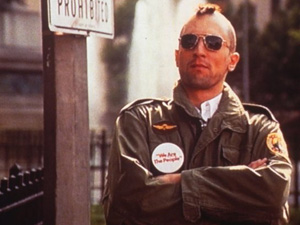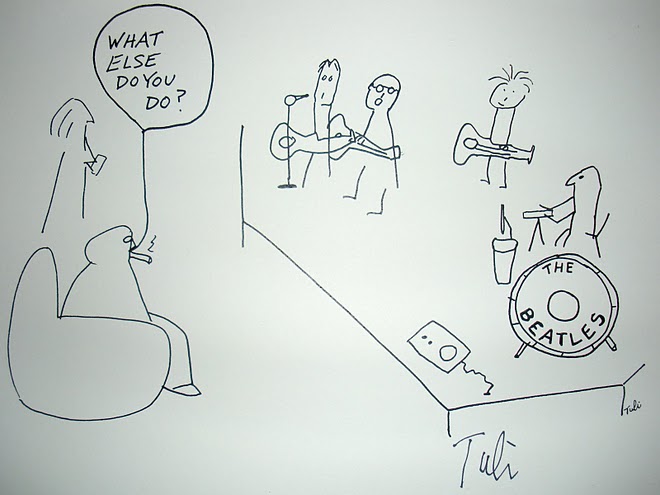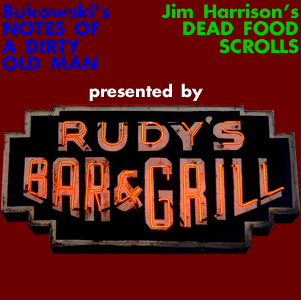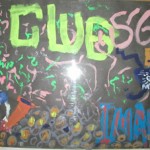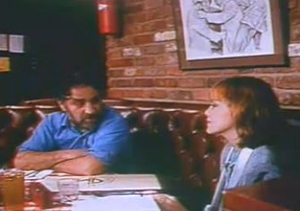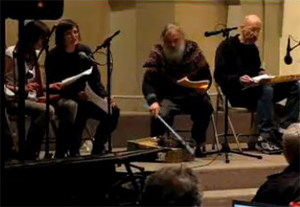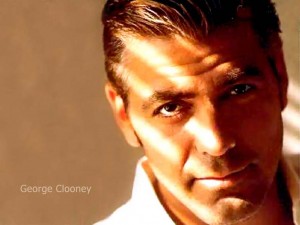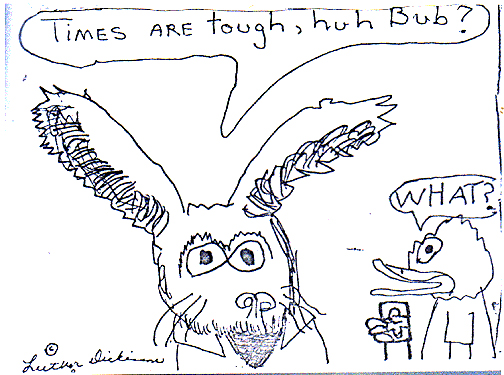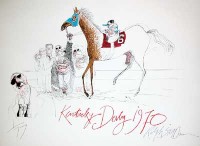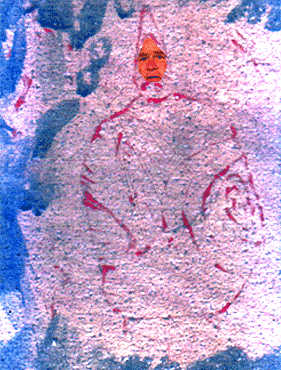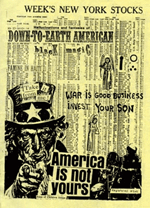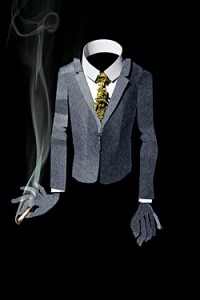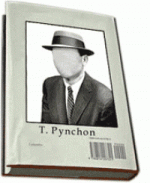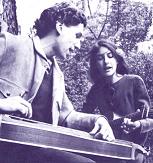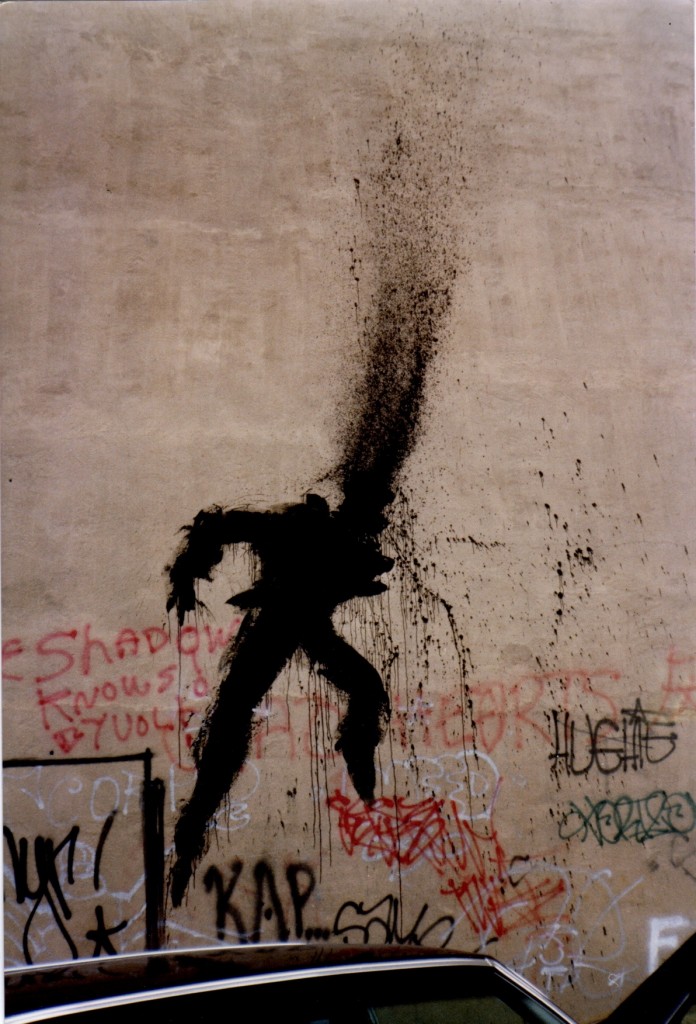The fiction of the state:
The Paris Review and the invisible world of American letters
by Richard Cummings
The Paris Review and the invisible world of American letters
by Richard Cummings
The Paris Review (PR hereafter except in quotations) has a new editor. Philip Gourevitch *(Ed: Note: replaced by Lorin Stein in April 2010 — http://www.nytimes.com/2011/02/27/fashion/27Stein.html?pagewanted=all ), a National Book Critics Circle Award winner for his book, We Wish to Inform You That Tomorrow We Will Be Killed With Our Families: Stories From Rwanda and a writer for The New Yorker, has taken the position that was held by George Plimpton until his death. Gourevitch replaces Brigid Hughes, whose brief tenure ended in considerable acrimony, with the PR board announcing that her contract would not be renewed. Dismissed from the Board was her supporter, novelist and long-time PR advisory editor, Elizabeth Gaffney, whose novel, Metropolis, published by Random House, then appeared to mixed reviews. A sort of ‘Gangs of New York’ meets Little Women, it sank like a stone. One wonders if Gaffney teaches her writing students how to write bad sentences about stupid things. It’s hard to imagine that Random House would have given Gaffney a contract for this mess of a book had she not been on the board of the PR at the time. Gourevitch has promised to revitalize the publication, continuing its tradition of publishing fiction, poetry and interviews with writers; but he also intends to emphasize non-fiction as well. With Robert Silvers of The New York Review of Books on the Board of the PR, and now with a major New Yorker writer at the helm, the concentric circle of the New York world of letters has diminished further in its insularity. But why should anyone care about a small literary magazine with a limited subscription base? And how does it manage to pay someone like Goureveich? Why does The New York Times give so much coverage to the magazine, when there are other publications of equal merit that labor on in relative obscurity? It is because the PR is special. Everyone knows that. But they don’t all know exactly why. Once, I didn’t either; but as fate it would have it, the truth would force itself on me without my making any effort to find it out. It all simply fell into my lap.
Frederic Bastiat wrote that the state was the greatest fiction, in which everyone tries to live off of everyone else. In the world of American letters (which is basically still New York) this resonates with particular force, as Maria Koenig Matthiessen would find out. Before she married novelist Peter Matthiessen and she was still married to advertising genius, Julian Koenig (himself a master of fiction, which is what his industry purveys) Maria would constantly complain to me that she was bored and that she had once been ‘in the swim’ in the literary world of London. Stuck in Bridgehampton, she was ‘out of it’, as she put it in her crisp British accent. With her relationship with Peter Matthiessen, she left the boring and superficial world behind her for one of intellectual and artistic authenticity and stimulation. Or so she thought.
Working for McGovern
Maria and I would often meet on the train to New York, I, traipsing in to meet with agents, editors and others in the book world, in pursuit of a literary career, she to her ‘Japanese tea ceremony’ lessons, as she explained it to me, which, in actuality, were her trysts with Peter Matthiessen. Matthiessen was ruggedly handsome, a mythic literary figure, who, according to legend, had ‘founded’ the PR in the early Fifties but who had given up his glamorous life as an expatriate literary lion, to become a fisherman on eastern Long Island.
I also had migrated to the Hamptons after living in Ethiopia (I had taught at the law school of the Haile Sellassie I University), and had given up my life as a law professor to write. Because of the horrors of the Vietnam War, I got sucked into politics, working for the nomination of anti-war candidate George McGovern. At the home of wealthy liberal activist and French scholar, Domna Stanton, where I had gone to attend a planning session for the McGovern campaign, I met George Plimpton for the first time. I have a photograph of that session, that shows all of us sitting around a table, with me between Plimpton and actress Tammy Grimes. Plimpton was the editor of the PR, a charming and attractive man who exuded warmth and good humor. He became famous trying his hand at pro football and boxing with Archie Moore. His books were best sellers. I told him how I had met his father, Francis Plimpton, at a similar gathering at Marietta Tree’s town house, to support the senate campaign of Adlai Stevenson III. We hit it off and he volunteered to work for me, carrying petitions for the McGovern delegates running in the First Congressional District on Long Island. He was against the Vietnam War and was for McGovern and I needed all the help I could get. Getting the McGovern slate on the ballot, which included me as a delegate, and withstanding the inevitable challenges from the regular Democratic organization, which viewed us as dangerous insurgents, was going to be no easy task. Plimpton did a great job. His petitions were perfect. He arrived at my house in Bridgehampton one afternoon, pulling up in his station wagon and waving them like a delighted child. ‘Great, George,’ I said. ‘This is a huge help.’ He was genuinely happy. But after the Eagleton affair - it was revealed McGovern’s choice for vice president, Thomas Eagleton, had received shock treatments for depression and resigned from the ticket - and McGovern’s disastrous defeat at the hands of Richard Nixon, I took my family and escaped to Barbados, to teach at the University of the West Indies. While there, I wrote an Op Ed piece called ‘Hailu and the Very Old Lion’, about an Ethiopian laborer who had moved all my furniture himself, and who had stood in front of Haile Sellassie’s pet lion as it sat on a stone fence, and laughed at it. I said the lion was old and toothless, like the Emperor himself, implying that he would not remain in power much longer, now that famine had come to Ethiopia. Charlotte Curtis, one of the last of the greats at The New York Times, accepted it and the Times published it in April of 1974, while I was still in Barbados. To my amazement and delight, I was contacted by George Braziller, of the eponymous publishing house, and by Ned Chase, (father of Chevy) who was editor in chief at Putnam’s, and asked by both of them do a book. My agent was the gentlemanly John Schaffner, whose eccentric family reminded everyone of the Sitwells. His wife, Perdita, had, it turned out, been secretary to James Jesus Angleton, literary scholar and chief of counterintelligence at the CIA. (His deputy was the novelist, William Hood.) Ned Chase took me to the legendary Billy’s, watering hole to the literary world, and told me he was going to give me a five book contract and that I was the ‘voice of your generation’. I floated back to the train and came home with the news. Braziller came to my house and sipped iced tea as he went through my book proposal, ‘Eagles Among the Lions’. He seemed genuinely pleased, even if he did drop the manuscript. I watched with horror as the pages slipped to the floor, but he quickly gathered them up with a broad smile, shook my hand vigorously and departed. This was it. I was in. Or so I thought.
A friend in the Hamptons who had read the Op Ed piece told me I should meet Peter Matthiessen, who wrote about the same sort of things. She got me together with him and a few other writers, but he was aloof and didn’t say anything to me. I shrugged it off and concentrated on doing a book proposal for Braziller and Chase. My proposal described how, while traveling in the north of Ethiopia, I had witnessed American troops in combat in Axum, where I had gone to see the famous obelisks. At the airport, American troops in combat fatigues swarmed all over the place, with American helicopters landing and taking off. I could make out the voice of an American pilot through the static on the airport radio saying, ‘I’ve gotta come in for more ammunition. I can’t fly around here without more ammunition.’
Secret war in Ethiopia
What I had witnessed was Nixon’s secret war in Ethiopia to defend Hails Sellassie from the Tigre Liberation Front and the Eritrean Liberation Front, as they both sought to overthrow the backward, feudal regime and to secede. Most of my students at the university were in the revolution, but the Americans were still behind Haile Sellassie, an important ally in the Cold War. The Horn of Africa was of considerable strategic importance, with Cold Warriors such as Secretary of State Henry Kissinger, believing the outcome of the struggle with the Soviet Union would be decided in the Ogaden. The insurgents were largely pro-Soviet, and if Ethiopia fell to the U.S.S.R., it would have a dagger at the heart of Saudi Arabia, just across the Red Sea. As an Air Force officer told me in confidence one night after a few too many beers, there had already been an uprising led by young Saudi air force officers against the Saudi royal family that American forces stationed at important bases in Ethiopia had put down. Then, John Schaffner phoned to tell me that something strange had happened. George Braziller had rushed into his office, waving the proposal. He threw it at Schaffner, shouting, ‘I can’t do this’, and bolted out the door. Ned Chase then phoned him to tell him the deal was off, giving no reason. I paid a visit to Chase at his office to find out what had happened. He was extremely nervous and fidgeted with papers on his desk. ‘I can’t find the proposal’, he explained. ‘I think I’ve lost it. Anyway, it’s too late to do anything. I’m sorry.’ It hit me like a blow to the solar plexus. Schaffner was per-plexed and found it unfathomable. He said that nothing like it had ever happened to him before in his career as an agent. ‘I don’t know what it is,’ he said to me. ‘It’s highly unusual.’ I had gambled a lot on my writing career, and now it lay in ruins. But then, Congress voted to impeach Nixon and the revolution came to Ethiopia on the night the Americans were staging a fashion show in Addis Ababa. Such was their obliviousness. Or their denial. Someone had photographed Haile Sellassie throwing meat to his pet lion, while millions of Ethiopians were starving to death. It was the ‘tipping point’ of the revo-lution. As the country went through the torture of Nixon’s downfall, Senator Fulbright uncovered a secret agreement between Nixon and Haile Sellassie, in which America pledged to come to his rescue if he were threatened by an internal insurgency. It was completely beyond the scope of Nixon’s author-ity. But when did that ever matter to him? He had already authorized the mass, illegal spying by the CIA on Americans as the anti-war protests grew in size and force. Years later, Angus McKenzie would posthumously reveal in his book, Secrets, with knowledge obtained through the Freedom of Information Act, how the CIA had penetrated counterculture anti-war publi-cations and shut them down. But Nixon was forced to resign, and his plans for a new Vietnam in Ethiopia were scratched, as was the infamous Huston plan, which would have effectively turned America into a police state. John Erlichman acknowledged as much. He asked me what I was doing during the Vietnam war. I told him I was working for McGovern. He looked straight at me and said, ‘You did the absolutely right thing.’ Nixon’s right-hand man, Erlichman had done time in prison, and was a sick and broken man when I met him in Atlanta. He died not long after I met him. But with a revolutionary government in place in Addis Ababa, America abruptly did a turn around and began support-ing the Eritrean secessionists, backing a new group, the Erit-rean Peoples Liberation Front, the EPLF, to displace the Marx-ist ELF. Professor Tesfatsion Medhane, an Eritrean who teaches at the University of Bremen, has documented this in his numerous publications. He was also my Amharic teacher and one of my students when I was teaching at the Haile Sellassie I University. And with my book safely out of the way, Thomas Kenneally surfaced with his To Asmara, extolling the great virtues of the Eritreans as they struggled for their independence from tyrannical Ethiopia. (Eritrea is today a totalitarian state, while Ethiopia is, more or less, a democracy.) When asked about this switch in American policy, Henry Kissinger famously remarked, ‘America has no permanent allies, only permanent interests’. America also seemed to have a convenient way of manipulating the American publishing industry. Fast forward a few years later, at a Christmas party at the home of Swedish artist Hans Hokanson and his wife, Barbara. With a tall Christmas tree lit with real candles, a huge roast pig, endless amounts of glug and a crowd of artists and writers, including James Rosenquist, The New Yorker cartoonist Steinberg, and Peter Matthiessen, the place was throbbing to Jimmy Cliff. From across the room, I saw Matthiessen glaring at me. Barbara Hokanson made her way towards me, stopping in front of where I was sitting. She leaned over and in a whisper, said, ‘Peter wants me to tell you that you should feel lucky that he doesn’t let you get close to him, because he could really hurt you.’ I looked up and saw Matthiessen, still glaring at me malevolently. ‘Why would he want to hurt me?’ I asked, but Barbara had already turned and walked away. I shrugged off the incident, but filed it away in my subconscious. After she started living with Matthiessen, Maria invited me to have lunch with her at Bobby Van’s to meet James Jones. Matthiessen was there, as well. Jones, who was gracious and cordial, was drinking grapefruit juice, on the wagon because of a heart condition. Throughout the lunch, Matthiessen sat sil-ently, occasionally giving me a strange glance. Maria was her usual gregarious self. I kept thinking how stunning she had looked at the Benson Gallery that summer, when she appeared barefoot, her hair wild, and she announced to me that she had left Julian and moved in with Peter. After she married Matthiessen, we met on the train. She seemed different, somewhat subdued. Rather gratuitously, she said, ‘Everything is a hoax.’ ‘Everything?’ I asked, incredu-lously. ‘Everything’, she answered.
Matthiessen was CIA
My memory was jogged when, sometime later, still in the Seventies, The New York Times disclosed, without citing sources, that Matthiessen had been in the CIA and that his literary activities had been a cover for his intelligence work. ‘Was that the hoax?’ I wondered. Did his comment to Barbara Hokanson that he could really hurt me have anything to do with his institutional affiliation? Matthiessen told friends that he had left the Agency in the Fifties, but did one every really leave it? I had been active in the anti-war movement. In the days of Richard Nixon, that could spell trouble. There was the coup in Chile and the murder of Allende. After Nixon’s fall, the national security state perpetuated itself under Henry Kissinger, who stayed on under Gerald Ford as secretary of state. William Colby still headed the CIA. Nothing had really changed. I pondered Matthiessen’s literary output. Partisans struck me as superficial and cynical and not particularly well written. At Play In The Fields of the Lord I found to be a wooden and tedious book. Far Tortuga, written in a West Indian dialect, was impossible to get through and condescending, yet it ended up on The New York Times best-seller list. The Snow Leopard I found to be pompous and utterly pretentious, but it, too, found its way onto the list. But his publisher was Farrar, Strauss and Giroux and Peter Matthiessen was a great writer, the mantra went, and the item in The New York Times faded from memory. His nature writing assignments took him to exotic places around the globe, he took up the cause, first of Caesar Chavez and then of the American Indians, and became a Buddhist monk.
The Pied Piper
It was after the publication in 1985 by Grove Press of The Pied Piper, my biography of Allard Lowenstein, that I found myself sitting next to Matthiessen’s ex-wife, Patsy Southgate, at a dinner party at the home of Gaby Lieber Rodgers, ex-wife of Jerry Lieber, half of the rock and roll team of Lieber and Stoller. Barney Rosset of the Grove Press and I had been duly vilified by Hendrik Hertzberg in The New York Review of Books, Ronald Radosh in The New York Times Book Review, and Myra McPherson, Ben Bradlee’s pit bull, in the Styles section of The Washington Post, because I had outed Lowenstein, a civil rights and anti-war activist who had served one term in Con-gress and had been assassinated by Dennis Sweeney in 1980, as a CIA operative and a closet gay. McPherson, after belting down three martinis in the restaurant of the Jefferson Hotel in Washington, said, ‘Richard, you can’t say these things. I am going to have to trash you. You should have put this in a novel.’ Martin Garbus, one of America’s leading civil liberties lawyers and attorney for Grove Press, asserted that the reviews had been ‘planted’ by those who wanted Lowenstein’s CIA background kept secret and were not real reviews. Patsy Southgate had been one of the most beautiful women of her generation. A Smith student, she was a fine writer and French translator who became engaged to Peter Matthiessen, who was at Yale. After a few vodkas and glasses of wine, she opened up to me and started talking about the CIA, something people did after the publication of The Pied Piper. She told me how Matthiessen had been recruited to the CIA at Yale to serve as an intelligence officer. After she and Matthiessen were married, they first went to CIA orientation and then to Paris, where Matthiessen’s assignment was to ‘found a literary magazine’. But founding a magazine was not within Matthiessen’s ken, so he befriended expatriate Harold Humes, who had attended MIT and who was starting a new literary publication that would feature interviews with writers, fiction and reviews of restaur-ants and clubs. Matthiessen provided funding from Sadruddin Aga Khan, the son of the Aga Khan, who had been John Train’s roommate at Harvard, and who agreed to serve as the magazine’s publisher. Train became managing editor. Then Matthiessen got rid of Humes and brought in his old friend from New York, George Plimpton, who had been studying English liter-ature at King’s College, Cambridge, to replace him. Plimpton, who had gone to Exeter and Harvard, was the son of Francis Plimpton, founder of the white shoe law firm of Debevoise, Plimpton (his partner was Eli Whitney Debevoise) who also served as counsel to the Democratic Party. Humes was furious. After the first edition came out, he boarded the ship carrying the magazines, found them in the hold, and with a stamp he had made up, stamped them all ‘Harold Humes, Editor’. Humes, who never found out why he had lost his magazine, later went mad. Southgate, who dis-approved of what Matthiessen was doing, gave him an ultimatum. She told him that he either left the Agency, or she would leave him. He didn’t, so she did. Matthiessen’s personal behaviour didn’t endear him to her, either. She, as well as friends from Southgates’s and Matthiessen’s Paris days, took note of his dark side, and his occasional gratuitous acts of cruelty, that astonished them. Carol Southern, who was married to Terry Southern and knew Matthiesssen and Southgate in Paris, relates how Matthiessen made Southgate carry a case of wine up the stairs to their apartment while she was pregnant. On another occasion, while out driving, he deliberately drove over a turtle as it was trying to across the road. He was also stingy, as Maria Matthiessen would find out. Having given up what she described as her ‘cushy deal’ married to Julian Koenig, who with Fred Papert, had founded Koenig, Papert, the hottest advertising firm in New York in the Sixties and early Seventies, with her posh house on Ocean Road in Bridgehampton, her lavish parties and a full-time West Indian housekeeper, she had to deal with Matthiessen’s austere lifestyle in his cottage in Sagaponack, as he doled out the pennies. Eventually, she was forced to take a job working as a gofer for Carol Phillips, who had founded Clinique and who had been married to Benny Goodman. Meanwhile, Freddy Plimpton divorced George, took up yoga and became a full-time resident of the Hamptons. It happened suddenly, with George at a loss for why she dumped him. Was it for Patsy Southgate reasons? Freddy wasn’t saying. She was a stunningly attractive woman with enormous sex appeal but unlike Plimpton, was totally averse to the socialite mentality that consumed him. It was as though he could never reconcile his liberal political beliefs and his membership in the Racquet Club. Like many upper class liberal Democrats, he seemed to lack an integrated personality. He could rail against inequality and then, participate in it without the slightest embarrassment, failing miserably to conflate his aristocratic predilections with his longing to be a bone fide member of the left. After a period in which he was in a funk, Plimpton married Sarah, an heiress to a Minnesota mining fortune, who res-embled his mother, at least physically. They also had in common that they were both from Cold Spring Harbor. Plimpton’s mother was one of the last of the great American grandes dames, a nonconformist whose social position was so secure, she was at complete ease in any situation. In this respect, she was the exact opposite of Francis Plimpton, a stiff and dour man with little or no sense of humor. At Marietta Tree’s legendary town house, where I met him, I found myself in a debate with him over Ian Smith’s Unilateral Declaration of Independence for Rhodesia, which violated the rights of the black majority. To my astonishment, Francis Plimpton, a supposedly liberal Democrat, who had served as an ambassador to the United Nations, supported the white racist Ian Smith and opposed the embargo placed on Rhodesia. I, on the other hand, had been commissioned by the U.C.L.A. Law Review to write an article on the illegality of the UDI, which I did, with complete conviction. After I submitted it and it was accepted, I was notified by the new editor-in-chief that it was being lifted from typeset and would not be published. America was violating the embargo because it needed the chrome for military reasons in Vietnam. But the U.C.L.A. Law Review? I had been asked to teach at U.C.L.A. Law School when I was in Ethiopia. Surely they were not part of the national security state. In any event, I got it published by the N.Y.U. Journal of International Law and Politics. There was no arguing with Francis Plimpton, so I switched the topic to his daughter’s psychological novel she told me she was working on. But George’s mother was another matter entirely. At a party in honor of James Merrill at his glamorous duplex apartment on the Upper East Side overlooking the Hudson, she objected to the fact that there was ‘nothing to nosh on’ with the drinks. ‘George, don’t you have any pea-nuts, at least?’ she scolded him. He sheepishly confessed that he didn’t have any. At that, she grabbed my arm and we raced to the elevator, down and out onto the street. Storming along looking for a store, she finally spotted a bodega. The Puerto Rican proprietor was bewildered by her sense of urgency about the peanuts, scurrying around until he located two jars of Planters. Back in the apartment, she tore into the kitchen and reappeared with a bunch of small dishes and poured the peanuts into them, placing the dishes on tables in various locations. Helping herself to a fistful, she began downing them as she gulped her martini, listening benignly to Sarah complain about a new apartment building that was going up that threatened their view. Then, before we began dinner, Plimpton introduced James Merrill and Richard Howard, who was the poetry editor of the PR, and lauded Sadruddin Aga Khan as the benefactor whose generosity, as publisher, had made the PR possible. I noticed Plimpton’s mother with a wry grin on her face. Did she know something I didn’t? What puzzles me is that when Plimpton’s memory is honored, there are accolades to his father, but never any mention of his unpretentious mother, who was clearly responsible for his buoyant and exuberant side. Louis Begley was guilty of this omission in an event at Guild Hall in East Hampton, at which Peter Matthiessen also spoke. Begley, a successful novelist and corporate lawyer, had been Francis Plimpton’s law partner, so his gratitude to the father is understandable; but George’s mother probably made him uncomfortable. Candor has a way of doing that to people.
40th anniversary
As I was leaving the party, Plimpton asked me if I was going to attend the 40th anniversary celebration of the PR in Paris, Mississippi, that he was planning, with events and parties in nearby Oxford, and, of course, fireworks. ‘Gosh, that’s a long way to go’, I said. ‘It will be worth it’, Plimpton winked. It would be, but not for the reasons Plimpton probably imagined. But PR celebrations were always major events. The one at Tony Duke’s Boys Harbor featured an array of American literary celebrities, including the two Normans, Mailer and Rush, with lavish food and drink. For a small literary magazine, it had a way of generating a considerable amount of attention. I was definitely going to Oxford, Mississippi, home to William Faulkner and Ole Miss. I checked into the guest lodge on the campus of Ole Miss. On the walls were photographs of legendary athletes as well as the beauties who had won Miss America titles. Ole Miss had more Miss America winners than any other institution in the country and a stroll on the campus showed me why. Gorgeous, beautifully dressed and groomed young women were every-where, smiling and greeting me graciously with a polite, ‘Hello, sir’, in languid southern accents. Not for nothing had Plimpton picked this place. I caught the exhibit of PR covers by famous artists that were on display at the museum and headed over to downtown Oxford for dinner. I found a restaurant in a hotel on the square and after a dinner of New Southern Cuisine (shrimp with grits), I sat down on a sofa in the lobby. In walked Plimpton, resplendent in a blue blazer, his white mane glorious in its disarray. He gave me a huge smile and invited me top join him and some friends for drinks later that night at a bar in Oxford. It was the night of the Ole Miss-Tulane basketball game and the place was packed with undergraduates partying in the manic manner of the southern elite. Smoke filled the room and a zydeko band blasted away in the background. George was sitting at a table with William Styron, Willie Morris, whom I knew from Bridgehampton and his Bobby Van’s days, George’s new wife, Sarah, and the then managing editor of the PR, James Linville, whom everyone called Jamie. I sat down at the end of the table next to Linville, with Plimpton opposite me. Waiters kept bringing huge pitchers of beer. I knew that Styron was supposed to be on the wagon, but he was drinking also. Gratuitously, Linville told me that he had read The Pied Piper. ‘The stuff about the CIA is fascinating’, he said. Then, without skipping a beat, he added. ‘Peter Matthiessen was in the CIA. The Paris Review was his cover. Peter is haunted by the CIA.’ I looked up and saw George, who was leaning over so far his chin was practically in my beer mug. He had heard every word but said nothing. Why Linville had volunteered this to me in these circumstances puzzled me. I thanked him for read-ing my book but said nothing further about the CIA. There was a forced conviviality that I found unnerving. Plimpton was somewhat cooler towards me and eyes narrowed a bit as he looked at Linville, but otherwise, he gave no indication that there was anything wrong in the slightest. We all drank and talked until it was quite late and departed.
Newsweek and the CIA
At a reception at a famous bookstore in Oxford, Plimpton recited the usual history of the PR, including the part about how, running with the bulls in Pamplona, with Sadruddin Aga Khan, he made the prince an offer he could not refuse to be the publisher. On the last night, we all gathered at a restaurant in Paris for catfish and fireworks. Plimpton avoided me, but I put that down to the fact that he was absorbed in hosting the event. I filed away in the recesses of my mind what Linville had said with the Patsy Southgate revelations and thought no more about it. I did wonder why they had told me these things. After my experience with the Lowenstein book, I had no intention of digging into people’s CIA affiliations any longer. I remembered how the writer Robert Sam Anson, who had worked for Newsweek, had come up to me at the John Steinbeck Book Fair at the Benson Gallery one summer after the publication of The Pied Piper and excoriated me. ‘I knew Allard Lowenstein’, he shouted as I sat at a table with copies of the book in front of me, a rather boisterous Blanche Weisen Cook directly to my left. ‘I was in the CIA. He would have told me if he had been in the CIA.’ Blanche recounted to me how she had been vilified for her Declassified Eisenhower in which she disclosed Eisenhower’s role in the CIA’s overthrow of Mossadegh in Iran and Arbenz in Guatemala, and the part played by former Luce publication executive, C. D. Jackson. as Eisenhower’s director of psychological warfare Sometime later, I was having lunch with Shana Alexander at Bobby Van’s when Anson came over to say hello to her, avoiding eye contact with me. After he left, I asked Shana if she knew that Robert Sam Anson was in the CIA. Between swallows, she casually said, ‘Robert Sam Anson was in the CIA. Lots of people at Time were also.’
Stephen Spender
But I did see George socially, on and off. A particularly glitt-ering New York event at which I encountered him, was the lavish reception at the Morgan for Stephen Spender, sponsored by the American Academy of Poets. In his eighties, Spender was still leonine and handsome. After he concluded his reading, we all adjourned to a champagne reception in a spacious, candle-lit hall, where Spender held court. Plimpton, the de facto host, was effusive. He managed to be both gregarious and distant to me. It was a perfect venue for Plimpton. Spender had been the editor of Encounter, which like The PR, had been a beneficiary of CIA largesse. It was a sort of old home week. A few years after the Linville incident, I was at an authors’ party at the home of Martin and Judy Shepard, publishers of the Permanent Press, which had published my secessionist book, Proposition 14. The novelist and playwright John Sherry, who was probably Peter Matthiessen’s closest friend and who had published Maggie’s Farm with Permanent Press, came over to me. I knew Sherry well. He was a gregarious and exuberant man, but now he was deadly serious. He told me he needed to speak with me out of earshot of the other guests, and led me to a corner of another, empty room. He informed me in hushed tones that Peter Matthiessen had confessed to him that Sadruddin Aga Khan and his foundation had never put up a penny for the PR and that all the money had come from the CIA. Sherry went on to say that, in his mind, Matthiessen, who wanted to be remembered as a novelist, was not a good one and never would be. Sherry lambasted At Play In The Fields Of The Lord, insisting that Matthiessen had no talent for writing novels, and that his good work was his nature writing. I took all of this in, knowing as I did about how the Congress for Cultural Freedom had funded publications such as the PR and Encounter, all of which Frances Stone Saunders would recount in her groundbreaking work, Who Paid The Piper?. But, while she stated that Matthiessen had been in the CIA, she had not gotten the goods on the PR. I learned later that she had gotten a letter from Matthiessen about the CIA and the PR, in which he said that the ‘CIA dumped the job on me’. I also learned later from a British scholar that the CIA had originally intended to set up art critic Clement Greenberg in Paris as the editor of a Paris edition of The Partisan Review, but dropped this option to go with Matthiessen and the PR. Shepherd Stone, who headed the Congress for Cultural Freedom, was a snob and insisted that those who worked for him be graduates of elite American colleges and universities. Stone might well have disdained Greenberg, who was a gradu-ate of Syracuse University and who had been an itinerant neck-tie salesman before becoming the leading booster of abstract expressionism and Jackson Pollock. Along with Barnet New-man, Greenberg had become the CIA’s favorite huckster of the avant guard, which he did as well for the benefit of the value of his own art collection. Quel fumiste, the Parisians might have said. No, Matthiessen, with his WASPy good looks and his literary pedigree (his uncle was F. O. Matthiessen, the brilliant, socially prominent left-wing literary critic at Harvard, who committed suicide before being outed as gay) was the better choice. Besides, Greenberg was Jewish (Stone, a Dartmouth graduate, was also, but he had changed his name and assim-ilated) and the CIA was imbued in the Fifties with the kind of anti-Semitism that was rampant at Yale, where much of the CIA recruiting had gone on.
George Plimpton was witting
Was this the end of it? What more was there to know about the PR? I wondered why Sherry had chosen to tell this to me with such a sense of urgency. Our conversation ended, we joined the other guests. But it didn’t add up. If all this were true, and I had no doubt that it was, surely George Plimpton wasn’t in the dark. He must have been ‘witting’ all along, as they say in Agency parlance. As I would find out, it was more than that. In the fall of 2003 I received some e-mails from Daniel Gallagher, an America graduate student in Paris researching American writers who wrote novels in Paris. He had read some articles by me on the Internet (I am a columnist for Lewrockwell.com,) at least one of which which made reference to Peter Matthiessen and the PR. Becoming intrigued with my thesis that the magazine was a CIA front, he read The New York Times article from 1977 that outed Matthiessen as CIA, using his career as an author only as cover for his intelligence activities. Gallagher commented: ‘It is true. The Paris Review was a hoax, part of the CIA world-wide propaganda effort.’ Through a friend, Gallagher located James Rentchler, who at first was identified only as a retired Foreign Service officer. Gallagher agreed to approach him on my behalf with questions I had suggested. Rentchler, it turned out was extremely rich, living in Paris and writing his memoirs. The Rentchler family is from Cincinnati, heirs to a giant railroad fortune. They all went to Princeton. George Rentchler was in my class there and was a friend. James Rentchler worked in the White House for both Presidents Carter and Reagan in the National Security Council on European affairs and served as Ambassador to both Guinea and Malta. His flat, as Gallagher described it, was filled with photos of American presidents and government officials. There were ‘hundreds’ of them, according to Gallagher, who noted the presence of an official looking American flag. Rentchler told him that he worked in the ‘cultural section organizing cultural events all over the world’. Rentchler him-self brought up George Plimpton and the CIA, so Gallagher’s question about Plimpton and the CIA ‘dove-tailed so beauti-fully that his response just flowed out’. Gallagher wrote: ‘When asked if George Plimpton’s father was CIA, he said “absolutely”, he was very well connected. I then asked him about George, saying that I had not found any trace whatsoever linking him to the Agency and he smiled and said that George was “an agent of influence”, and that he travelled here, there, did this, did that, etc. “Those guys at the Congress for Cultural Freedom, George was in with all of them, he knew all those guys.” That’s what he said.’ When Gallagher asked him who else he should speak to, he referred him to Frances Stoner Saunders. Gallagher was be-mused. He wrote, ‘The Review was a total CIA propaganda machine, from 1953 right up to the last issue.’ Agents of influence for the CIA, as Tom Braden pointed out in a number of articles, were writers, editors and publishers who penetrated the culture on behalf of the CIA. They were invariably paid. That George Plimpton never took a salary from the PR was undoubtedly true. He didn’t have to.
A change of publisher
The PR was soon to have a change in publishers. Following the death of Prince Sadruddin Aga Khan, Plimpton persuaded Dru Heinz to become the PR publisher. She also funds a major literary prize through the Dru Heinz Trust. At the same time, it reopened its Paris office, staffing it with novelist Harry Matthews, naming two editors for a new London office, this all at a time when anti-American sentiment was escalating in Europe because of the invasion of Iraq. Leading vocal critics of American policy were John LeCarrÈ and Harold Pinter. Coincidentally, James Linville took up residence in London, subletting Perry Anderson’s flat. Soon after, the influential, virulently anti-war London Review of Books published Anderson’s pro-war article, ‘The Casuistries of War.’ Linville vehemently denies that this coincidence had anything to do with a change of policy at the LRB, but he acknowledges that ‘at dinner parties, and such’, he did argue against the anti-American position of British writers and intellectuals, in what he described as ‘informal debates’. While acknowledging that the CIA sought to recruit him, he insists that he rebuffed their efforts. In addition to this, an ‘anonymous donor’ purchased the PR archives for $500,000 and donated all it to the Morgan Library in New York, while Charles Ryskamp was still the director. With all of this information at hand, I sent several e-mails to The New York Times to suggest corrections in articles it had published on the PR. After George Plimpton died, Bill Borders e-mailed me with Plimpton’s obituary, asking me what, if any-thing was wrong with it. I told him that Peter Matthiessen was not a founder of the PR, that Harold Humes had founded it and that Matthiessen had taken it over it at the behest of the CIA, getting rid of Humes. ‘To write about Matthiessen and The Paris Review without mentioning that it was his CIA cover is bad journalism’, I argued. ‘It omits this important aspect of The Paris Review that it was part of the propaganda effort against the Communist and Soviet influence in Europe during the Cold War.’ I went on to explain what I had learned about Plimpton. There was no response. In a recent article in The Times that the PR had not renewed Brigid Hughes contract, the reporter described Plimpton as ‘the founding editor’ of the PR. I e-mailed Dan Okrent, the ombudsmen, to correct this error and to, once again, set out the facts of the PR. A brief correction appeared, saying only that Plimpton was not the ‘founding editor’ but rather ‘one of the founding editors’.
A deafening silence
In late fall of 2003, I went into New York to have a dinner meeting with Taki and Scott McConnell of The American Conservative to discuss my proposed article on Plimpton and the PR, to be titled, ‘An American In Paris’. The article, a lean and to the point (two pages) piece that stated all the facts, appeared in February of 2004 and produced a deafening silence. I did send it to my former agent, Tim Seldes, who had been Plimpton’s agent, and he said he found it ‘fascinating’ and that he would show it to Sarah Plimpton. She never responded, at least not directly to me. But on the way back on the Hampton Jitney to Bridgehampton from the dinner with Taki and Scott McConnell, I happened to pick up a copy of The New York Post and came across a very small article, just a couple of para-graphs, that said the Nixon administration, during the 1970s, had notified publishers that it didn’t want any books to be published on Ethiopia. It was for national security reasons. Did America have the D-notice system that prevailed in Brit-ain, so the government could effectively censor by ‘request’ in the interests of national security? Some time later, I phoned Ned Chase, one of the editors who had asked me to do an Ethiopian book and then reneged. His wife told me he had Alzheimer’s. She was horrified by what I told her. I then wrote a letter to George Braziller telling him that I knew what had happened to the Ethiopian proposal, but that I forgave him because I didn’t know what I would have done under similar circumstances. He rang me up, suggesting that we get together for lunch. We had lunch at Le CafÈ CrËme on Madison Avenue, a small French brasserie that was so Parisian, I thought Braziller and I should have been speaking French, as though we were in a Chabrol film. He asked after Barney Rosset. I brought up the article and George laughed. But a bit later, he said could not recall the circumstances surrounding his return of the ‘Eagles Among The Lions’ proposal to John Schaffner. He did relate that his book club, The Book Find Club, had been the victim of McCarthyism and that he ‘got wise and went into literature instead’. It was all very congenial. Afterwards, George gave me copy of a new book of his, a handsome edition of Langston Hughes’ great poem ‘Let America Be America Again’, with woodcuts by Antonio Frasconi. The poem ends: /O, yes, /I say it plain,/America never was America to me, /And yet I swear this oath-America will be! /An ever-living seed,/Its dream. /Lies deep in the heart of me./We the people must redeem/Our land/ the mines/ the plants,/the rivers,/The mountains and the endless plain /All, all the strength of these/Great green states/And make America again! It was Braziller’s way of telling me that he had made compromises he didn’t want to, so he could survive, but that somehow, a better country was still possible.
Did the CIA firebomb Grove Press?
But did he know about the spying by the CIA on Grove Press, Evergreen Review and Barney Rosset and the effort it made to close down Grove? After the issue of Evergreen appeared with Paul Davis’ legendary depiction of Che Guevara on the cover, Cuban exiles firebombed the offices of Grove. Rosset insists it was done at the behest of the CIA. His CIA file would appear to bear him out. I saw Rosset’s CIA file and is gave me a chill. The boxes lined the walls of his loft. They knew all about his finances, what he was publishing, and they knew what they hated. When the strike broke out that crippled Grove Press in the early Seventies, it was organized by small unions unrelated to the publishing industry, the Furriers, Meatpackers, organ-izations like that. Why did they pick Grove, when it was a small, independent house with few employees? If they were starting to organize the publishing industry, it would have made more sense to do it at Random House or some other large organization with many editors. But if you thought about it, it made sense. The unions involved in trying to break Grove were part of the AFL-CIO, and Jay Lovestone, who founded the American Communist Party but was expelled personally by Joseph Stalin, headed its international division. Barely escaping from Moscow with his life, Lovestone became a bitter enemy of the Soviet Union. Recruited to the CIA, as Ted Morgan has documented in A Covert Life, his biography of Lovestone, he took over the unions’ international office dispensing funds all over the world for anti-Soviet activities. Grove Press and Evergreen Review were under suspicion. Grove published radical books and Evergreen Review was a leading anti-Vietnam war publication. It was a natural target for Lovestone, whose case officer was James Jesus Angleton. Grove survived the strike, but in a truncated version. By the time it published The Pied Piper, it needed an influx of cash, which is why Barney Rosset was finally forced to sell it to Lord Weidenfeld and Ann Getty. Evergreen Review folded entirely, so the CIA got its wish. But I wondered how the CIA had managed to get to the publishers to tell them not to do books on Ethiopia. And then, I remembered Robie Macauley. Macauley, who had once worked for the Congress of Cultural Freedom, and allegedly was let go, became, after doing a column for Playboy, Senior Literary Editor at Houghton Mifflin. He was known for developing new fiction writers and for having a passion for fine literature. A modest, soft-spoken man, he could have passed for a vacuum cleaner salesmen, the way many CIA intelligence officers could. Because that was, in fact, what he was. At lunch with me some-time before he died, Robie quietly volunteered that all the time he had been Senior Literary Editor at Houghton Mifflin, he had run the entire CIA program in sub-Saharan Africa. That, of course, included Ethiopia. So, it was Robie who had stuck it to me. After his obituary appeared in The New York Times, listing all his literary honors, I phoned up the reporter who had written it to tell him he had left out Robie’s CIA career. There was a brief silence, after which he said, ‘We can’t put everything into an obituary.’ They had known. They were just keeping it out. In the case of Roger Strauss, The New Yorker and Salon.com didn’t keep it out. Strauss, the founder of Farrar, Strauss and Giroux, worked for the CIA, with a secret phone in a special desk drawer to which only he had the key. With that phone he could reach his case officer in Langley. All his European acquisition editors were CIA agents. Strauss was also, rather conveniently, Peter Matthiessen’s publisher. Before the publication of his God And Man At Yale, William Buckley wrote an article for Commonweal, in which he argued for the creation of a ‘totalitarian bureaucracy’. Buckley had been recruited to the CIA out of Yale. His case officer at the Agency was E. Howard Hunt, novelist and Watergate conspirator. Buckley co-founded The National Review with former Trotskyite, James Burnham, who also worked for the CIA. Buckley got his wish for a bureaucratic dictatorship when the National Security Act was amended in 1949. Under the direction of George Kennan, the CIA developed its covert action capability, all of which Kennan later regretted as ‘the biggest mistake of my life’, as he put it. Still, that power was abused, as the CIA engaged in illegal acts against David Ellsberg, Barney Rosset, Angus McKenzie and many others, including me, because the censoring of unwritten books is a form of unconstitutional prior restraint. This has had a powerful effect on free expression in America, engendering timidity in the publishing world from which it has never recovered. Now, with the enactment of the Patriot Act, these illegal activities are legal, including protective detention, with the privilege of the writ of habeas corpus suspended by impli-cation. Writing under these conditions becomes the supreme challenge in a society that George Orwell would easily have recognized. The national security state has been transformed into the police state, not unlike life under Franco in Spain, which I personally experienced. You are free to go to the beach when you want, to go shopping when you want, but the closer you get to the Third Rail of power, the greater the peril. The bloody crossroads, as Cyril Connolly called them, of literature and politics has become increasingly bloody, with the result that literary life in America has become impenetrably bland: The Lovely Bones, The Five People You Meet In Heaven - on it goes. Get with the team or shut up. Even the 9/11 novels all seem contrived and banal. An anti-Bush book by a former government employee did appear during the election, and a CIA analyst wrote a book criticizing the ‘imperial hubris’ of the administration. But after the election, Bush appointed Porter Goss to head the Agency, and he quickly purged all dissenters. Since then, it is as though an iron curtain has descended on American publishing.
Why the silence?
But why the total silence about the revelations about the PR, given that Matthiessen has told the truth to a number of people? ‘The true division of humanity’, Victor Hugo wrote in Les Miserables, ‘is between those who live in light and those who live in darkness’. And Solzhenitsyn said that the first obligation of the writer was ‘not to be part of the lie’. But, alas, much of the literary world and the media that reports on it, choose to remain in the darkness and be part of the lie because that’s what it takes to make a living in a culture of lies. And maybe, it all has to do with the PR still being a CIA operation, which is why no one will write about it as an ongoing operation, according to CIA policy. There is, in sum, considerable denial in the world of American letters, and as they say at A.A., I’m told, ‘denial is not a river in Egypt’. George Plimpton ultimately knew the difference between the light and the darkness, which is why, before he died, he named Barney Rosset of Grove Press, as the first recipient of the Paris Review Hadada, a bronze statuette of a bird, as ‘an editor, publisher or writer who has distinguished themselves in furthering the cause of contemporary literature’. But just before the 50th anniversary celebration of the PR to be held at Cipriani’s, George Plimpton died. The celebration went on any way, with an indoor fireworks display in honor of Plimpton’s honorary title of Fireworks Commissioner of New York. Garrison Keillor hosted the event. Guests were seated with literary table hosts, including Paul Auster, Rick Moody, Michael Cunningham, Lorrie Moore, John Ashbery, James Alter, Francine Prose and Kurt Vonnegut. There were readings from the PR by poet Robert Pinsky and music by David Amram, Israela Margaliat, Ilann Maazel, and the Bethune Big Band. But the bronze statuette was not presented to Barney Rosset before the other guests. Rather, as he related it to me, he was shuffled off to a hallway, where it was quickly presented to him out of sight of everyone else. He was not even invited to the dinner. Was Robert Silvers still furious over The Pied Pier? ‘George’s last joke’, Barney quipped. Barney remembered a literary conference in Puerto Rico, where he ran into George Plimpton, Peter Matthiessen and William Styron. Everyone was convivial, with the three inviting Rosset to drive with them away from the hotel to a bar where they could ‘drink in private’. But once in the car with Barney, they began pressuring him to allow Grove to be used for the publication of the works of Latin American anti-Communist writers, the way the CIA had published Ignazio Silone, Richard Wright and others in The God That Failed. Barney refused to join the secret team and they put him out of the car, obliging him to trudge the three miles in the dark back to the hotel. Matthiessen gave evidence of being remorseful. After the disastrous legal fight with then governor of South Dakota, Bill Janklow, involving allegations in Matthiessen’s book on the American Indian Movement, In The Spirit of Crazy Horse, he almost lost his house. He developed a serious melanoma, but survived. Then he completed his Everglades trilogy, Killing Mister Watson, Lost Man’s River, and Bone by Bone, a morality tale on the evils of racism and the excesses of capitalism. The books contain some passages of exquisite prose, as if it took his confession to John Sherry for this to finally happen. As Virginia Woolfe observed about writing novels, you can’t be honest about other people unless you are honest about yourself. Matthiessen is working hard at being a different man, as if trying to honor James Baldwin’s professed goal in life: ‘To be a good writer and a decent person.’ As for myself, I still remember seeing George for the last time. I was coming back from a play, walking east on West 43rd Street, until I got to Fifth Avenue, heading for the Jitney. It was late, and the streets were dark. Then, I caught sight of him on his bike, going against the traffic, his trademark white hair in stark contrast to the shadows. I saw him raise his arm and wave to me, and I shouted into the night, ‘Hey, George!’ and waved back. He was gone.
****************
Richard Cummings – Author of the 1985 Grove classic bio (Barney always felt was the book that sunk him with Getty) The Pied Piper – Allard K. Lowenstein and the Liberal Dream. His essays can be found on the Libertarian website http://www.LewRockwell.com/ and he is a contributing editor forThe American Conservative.



